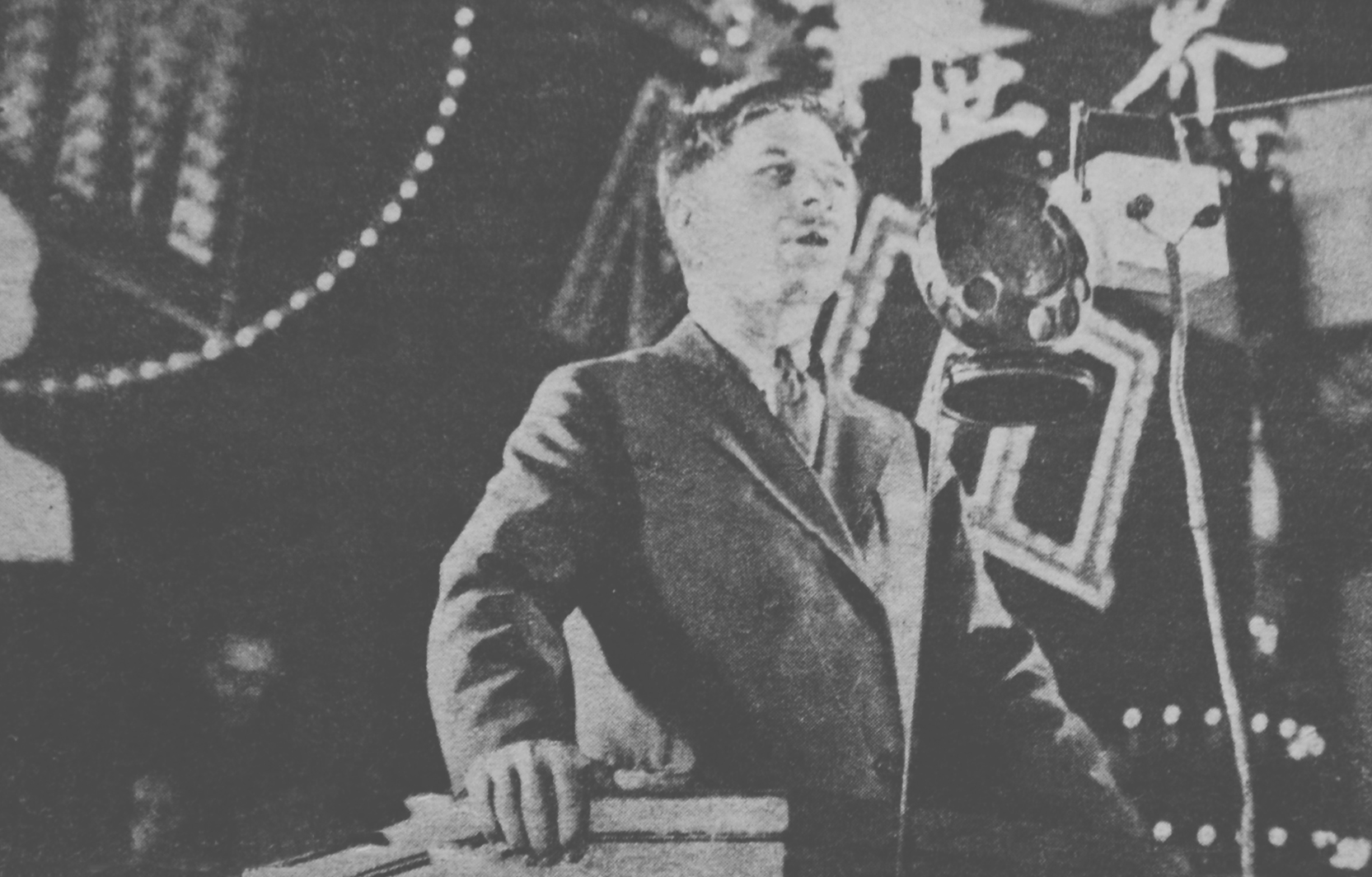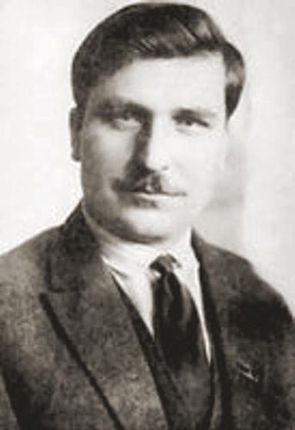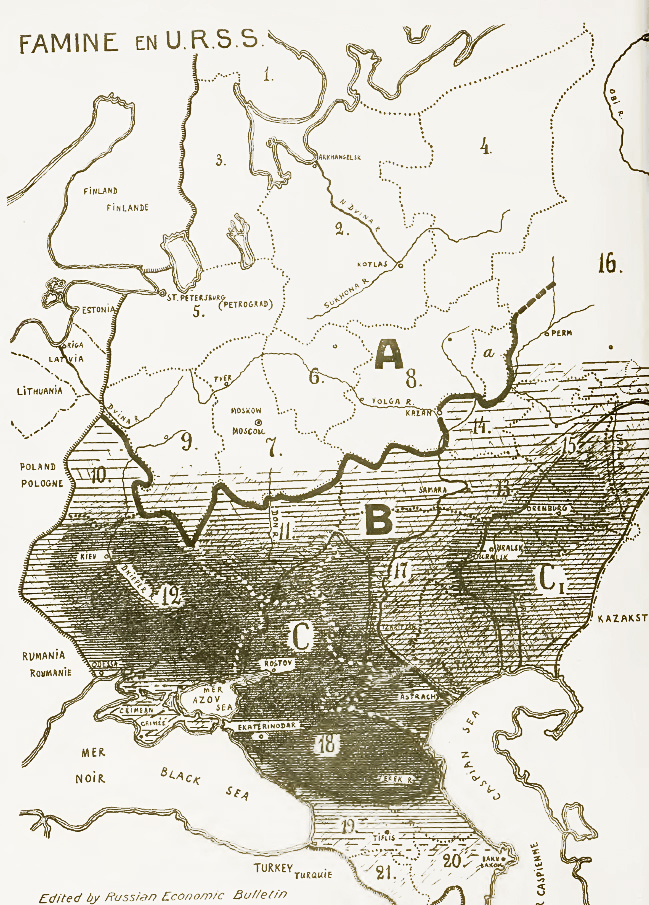|
Pavel Postyshev
Pavel Petrovich Postyshev (russian: Па́вел Петро́вич По́стышев; – 26 February 1939) was a Soviet politician, state and Communist Party official and party publicist. He was a member of Joseph Stalin's inner circle, before falling victim to the Great Purge. In 2010, a court in Kyiv judged Postyshev guilty of complicity in genocide because of his part in causing the mass starvation in Ukraine in the early 1930s, known as the Holodomor. Early career Postyshev was born in Ivanovo-Voznesensk in Vladimir Governorate in to the family of a Russian weaver. He was a member of the Russian Social-Democratic Labour Party from 1904, and later joined the Bolshevik faction, and worked fulltime, illegally, as a party organiser. Arrested on 24 April (old style) 1908, he spent four years in Vladimir Central Prison, and then was deported to the Irkutsk region. During the October Revolution, he played a major role in bringing Irkutsk under Bolshevik control, and then in cre ... [...More Info...] [...Related Items...] OR: [Wikipedia] [Google] [Baidu] |
Ivanovo
Ivanovo ( rus, Иваново, p=ɪˈvanəvə) is a types of inhabited localities in Russia, city in Russia. It is the administrative center and largest city of Ivanovo Oblast, located northeast of Moscow and approximately from Yaroslavl, Vladimir, Russia, Vladimir and Kostroma. Ivanovo has a population of 361,644 as of the 2021 Census, making it the List of cities and towns in Russia by population, 50th largest city in Russia. Until 1932, it was previously known as ''Ivanovo-Voznesensk''. The youngest city of the Golden Ring of Russia. The city lies on the Uvod River, in the centre of the eponymous oblast. Ivanovo gained city status in 1871, and emerged as a major centre for textile production and receiving a name of the "Russian Manchester". The city is served by Ivanovo Yuzhny Airport. Geography The Uvod River, a tributary of the Klyazma River, Klyazma, flows from north to south, dividing the city into two halves. There are also two rivers in Ivanovo: the Talka River, Talka ... [...More Info...] [...Related Items...] OR: [Wikipedia] [Google] [Baidu] |
17th Politburo And The 17th Secretariat Of The All-Union Communist Party (Bolsheviks)
The Politburo of the 17th Congress of the All-Union Communist Party (Bolsheviks) was in session from 1934 to 1939. Composition Members Candidates References {{Communist Party of the Soviet Union Politburo of the Central Committee of the Communist Party of the Soviet Union members 1934 establishments in the Soviet Union 1939 disestablishments in the Soviet Union ... [...More Info...] [...Related Items...] OR: [Wikipedia] [Google] [Baidu] |
Russians
, native_name_lang = ru , image = , caption = , population = , popplace = 118 million Russians in the Russian Federation (2002 ''Winkler Prins'' estimate) , region1 = , pop1 = approx. 7,500,000 (including Russian Jews and Russian Germans) , ref1 = , region2 = , pop2 = 7,170,000 (2018) ''including Crimea'' , ref2 = , region3 = , pop3 = 3,512,925 (2020) , ref3 = , region4 = , pop4 = 3,072,756 (2009)(including Russian Jews and Russian Germans) , ref4 = , region5 = , pop5 = 1,800,000 (2010)(Russian ancestry and Russian Germans and Jews) , ref5 = 35,000 (2018)(born in Russia) , region6 = , pop6 = 938,500 (2011)(including Russian Jews) , ref6 = , region7 = , pop7 = 809,530 (2019) , ref7 ... [...More Info...] [...Related Items...] OR: [Wikipedia] [Google] [Baidu] |
Vladimir Governorate ...
{{Commons cat, Governorates of the Russian Empire Subdivisions of the Russian Empire Russian Empire The Russian Empire was an empire and the final period of the Russian monarchy from 1721 to 1917, ruling across large parts of Eurasia. It succeeded the Tsardom of Russia following the Treaty of Nystad, which ended the Great Northern War. ... [...More Info...] [...Related Items...] OR: [Wikipedia] [Google] [Baidu] |
Holodomor
The Holodomor ( uk, Голодомо́р, Holodomor, ; derived from uk, морити голодом, lit=to kill by starvation, translit=moryty holodom, label=none), also known as the Terror-Famine or the Great Famine, was a man-made famine in Soviet Ukraine from 1932 to 1933 that killed millions of Ukrainians. The Holodomor was part of the wider Soviet famine of 1932–1933 which affected the major grain-producing areas of the Soviet Union. While scholars universally agree that the cause of the famine was man-made, whether the Holodomor constitutes a genocide remains in dispute. Some historians conclude that the famine was planned and exacerbated by Joseph Stalin in order to eliminate a Ukrainian independence movement. This conclusion is supported by Raphael Lemkin. Others suggest that the famine arose because of rapid Soviet industrialisation and collectivization of agriculture. Ukraine was one of the largest grain-producing states in the USSR and was subject to unre ... [...More Info...] [...Related Items...] OR: [Wikipedia] [Google] [Baidu] |
Great Purge
The Great Purge or the Great Terror (russian: Большой террор), also known as the Year of '37 (russian: 37-й год, translit=Tridtsat sedmoi god, label=none) and the Yezhovshchina ('period of Nikolay Yezhov, Yezhov'), was General Secretary of the Communist Party of the Soviet Union, Soviet General Secretary Joseph Stalin's campaign to solidify his power over the party and the state; the Purge, purges were also designed to remove the remaining influence of Leon Trotsky as well as other prominent political rivals within the party. It occurred from August 1936 to March 1938. Following the Death and state funeral of Vladimir Lenin, death of Vladimir Lenin in 1924 a power vacuum opened in the Communist Party of the Soviet Union, Communist Party. Various established figures in Lenin's government attempted to succeed him. Joseph Stalin, the party's General Secretary, outmaneuvered political opponents and ultimately gained control of the Communist Party by 1928. Initially ... [...More Info...] [...Related Items...] OR: [Wikipedia] [Google] [Baidu] |
Joseph Stalin
Joseph Vissarionovich Stalin (born Ioseb Besarionis dze Jughashvili; – 5 March 1953) was a Georgian revolutionary and Soviet political leader who led the Soviet Union from 1924 until his death in 1953. He held power as General Secretary of the Communist Party of the Soviet Union (1922–1952) and Chairman of the Council of Ministers of the Soviet Union (1941–1953). Initially governing the country as part of a collective leadership, he consolidated power to become a dictator by the 1930s. Ideologically adhering to the Leninist interpretation of Marxism, he formalised these ideas as Marxism–Leninism, while his own policies are called Stalinism. Born to a poor family in Gori in the Russian Empire (now Georgia), Stalin attended the Tbilisi Spiritual Seminary before joining the Marxist Russian Social Democratic Labour Party. He edited the party's newspaper, ''Pravda'', and raised funds for Vladimir Lenin's Bolshevik faction via robberies, kidnappings and protection ... [...More Info...] [...Related Items...] OR: [Wikipedia] [Google] [Baidu] |
Communist Party Of The Soviet Union
"Hymn of the Bolshevik Party" , headquarters = 4 Staraya Square, Moscow , general_secretary = Vladimir Lenin (first) Mikhail Gorbachev (last) , founded = , banned = , founder = Vladimir Lenin , newspaper = ''Pravda'' , position = Far-left , international = , religion = State Atheism , predecessor = Bolshevik faction of the RSDLP , successor = UCP–CPSU , youth_wing = Little Octobrists Komsomol , wing1 = Young Pioneers , wing1_title = Pioneer wing , affiliation1_title = , affiliation1 = Bloc of Communists and Non-Partisans (1936–1991) , membership = 19,487,822 (early 1989 ) , ideology = , colours = Red , country = the Soviet Union The Communist Party of the Soviet Union (CPSU),; abbreviated in Russian as or also known by various other names during its history, was the founding and ruling party of the Soviet Union. Th ... [...More Info...] [...Related Items...] OR: [Wikipedia] [Google] [Baidu] |
Bolsheviks
The Bolsheviks (russian: Большевики́, from большинство́ ''bol'shinstvó'', 'majority'),; derived from ''bol'shinstvó'' (большинство́), "majority", literally meaning "one of the majority". also known in English as the Bolshevists,. It signifies both Bolsheviks and adherents of Bolshevik policies. were a far-left, revolutionary Marxist faction founded by Vladimir Lenin that split with the Mensheviks from the Marxist Russian Social Democratic Labour Party (RSDLP), a revolutionary socialist political party formed in 1898, at its Second Party Congress in 1903. After forming their own party in 1912, the Bolsheviks took power during the October Revolution in the Russian Republic in November 1917, overthrowing the Provisional Government of Alexander Kerensky, and became the only ruling party in the subsequent Soviet Russia and later the Soviet Union. They considered themselves the leaders of the revolutionary proletariat of Russia. Their beli ... [...More Info...] [...Related Items...] OR: [Wikipedia] [Google] [Baidu] |
Russian Social Democratic Labor Party
The Russian Social Democratic Labour Party (RSDLP; in , ''Rossiyskaya sotsial-demokraticheskaya rabochaya partiya (RSDRP)''), also known as the Russian Social Democratic Workers' Party or the Russian Social Democratic Party, was a socialist political party founded in 1898 in Minsk (then in Northwestern Krai of the Russian Empire, present-day Belarus). Formed to unite the various revolutionary organizations of the Russian Empire into one party, the RSDLP split in 1903 into Bolsheviks ("majority") and Mensheviks ("minority") factions, with the Bolshevik faction eventually becoming the Communist Party of the Soviet Union. History Origins and early activities The RSDLP was not the first Russian Marxist group; the Emancipation of Labour group had been formed in 1883. The RSDLP was created to oppose the revolutionary populism of the Narodniks, which was later represented by the Socialist Revolutionary Party (SRs). The RSLDP was formed at an underground conference in Minsk in M ... [...More Info...] [...Related Items...] OR: [Wikipedia] [Google] [Baidu] |
Orgburo
The Orgburo (russian: Оргбюро́), also known as the Organisational Bureau (russian: организационное бюро), of the Central Committee of the Communist Party of the Soviet Union existed from 1919 to 1952, when it was abolished at the 19th Congress of the Communist Party and its functions were transferred to the enlarged Secretariat. Role The Orgburo was established during Lenin's reign to make important decisions about organisational work in the Soviet Union. It oversaw the work of local Party committees and had the power to select and place Communist Party members in positions as it saw fit. The functions of the Orgburo and the Politburo were often interconnected, but the latter was ultimately the final decision-maker. While the Politburo mostly focused on strategic planning and monitoring of the people and status of the country, the Orgburo was tasked with overseeing the Party cadre and its assignment to various positions and duties, presumably in fu ... [...More Info...] [...Related Items...] OR: [Wikipedia] [Google] [Baidu] |
16th Orgburo Of The All-Union Communist Party (Bolsheviks)
The Politburo of the 16th Congress of the All-Union Communist Party (Bolsheviks) was in session from 1930 to 1934. Composition Members Candidates References {{Communist Party of the Soviet Union Politburo of the Central Committee of the Communist Party of the Soviet Union members 1930 establishments in the Soviet Union 1934 disestablishments in the Soviet Union ... [...More Info...] [...Related Items...] OR: [Wikipedia] [Google] [Baidu] |








.jpg)